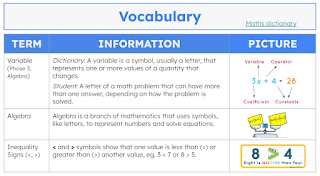Day 5 in the Mathematics Practice Intensive covered all things algebraic!
The biggest take away for me was the vocabulary. This also linked with something that someone said today and I thought about how often I talk about this with my colleagues too - "Lots of students can do the maths, they just don't understand the vocabulary. They don't understand what they are being asked to do in the question/maths problem" I can see the value in using TIP charts a lot more regularly in my programme and a lot more revising of vocabulary.
I also hadn't thought about the fact that all those symbols that we use daily in maths are actually crucial for algebra and also crucial for students to actually understand what they mean. For example the good old equals sign not just meaning that something equals something else but that two sides balance, they are the same.I think it has been fair to say that Algebra has been a strand of maths that we teach but perhaps as a stand alone topic when it should be integrated throughout. If you actually look at what algebra is, we are teaching it throughout our maths programme but I don't think we are being specific enough about it being algebra. The changes I am going to make to specifically teach the vocabulary that goes with it and what it is, will hopefully stop students from feeling like algebra is a topic to be feared!
The brilliance of algebra problems is that they can also be used to cover some choral counting, shared visual representations of what problems actually mean and number talk strategies.
I am heading away to rethink my maths sessions. Is there a way that I can include the choral counting, number talk strategies and algebraic concepts/vocabulary more regularly into my maths daily/weekly planning?






Kai ora Michelle,
ReplyDeleteVocabulary seems to be the key component that all teachers are commenting on in their blog posts. Mathematics is a language of its own and has lots of vocabulary for students to learn. I often talk about transferring what we do in literacy across to mathematics when it comes to learning new vocabulary. It is sad that some of our students are failing maths because of reading and vocabulary. Also the problem solving being able to unpack the maths out of a word problem. The more we expose our students to these and teach them strategies to support them it will help.
Making connections in maths is so important. I am looking forward to hearing and seeing how you have solved the problem of integrating choral counting, number talk strategies and algebraic concepts/vocabulary. Have a great week.
Donna
Kia ora Michelle,
ReplyDeleteI completely agree with your approach of integrating key strands such as Algebra throughout your maths programmes, offering opportunities for the children to unpack and discuss the meaning of key vocabulary, and then allowing them to use this vocabulary to demonstrate a deeper understanding. It’s been fantastic to see how you seamlessly incorporate strategies such as choral counting and number talks into your daily lessons. I’ve observed the children making meaningful connections.
Ngā mihi,
Ilisa